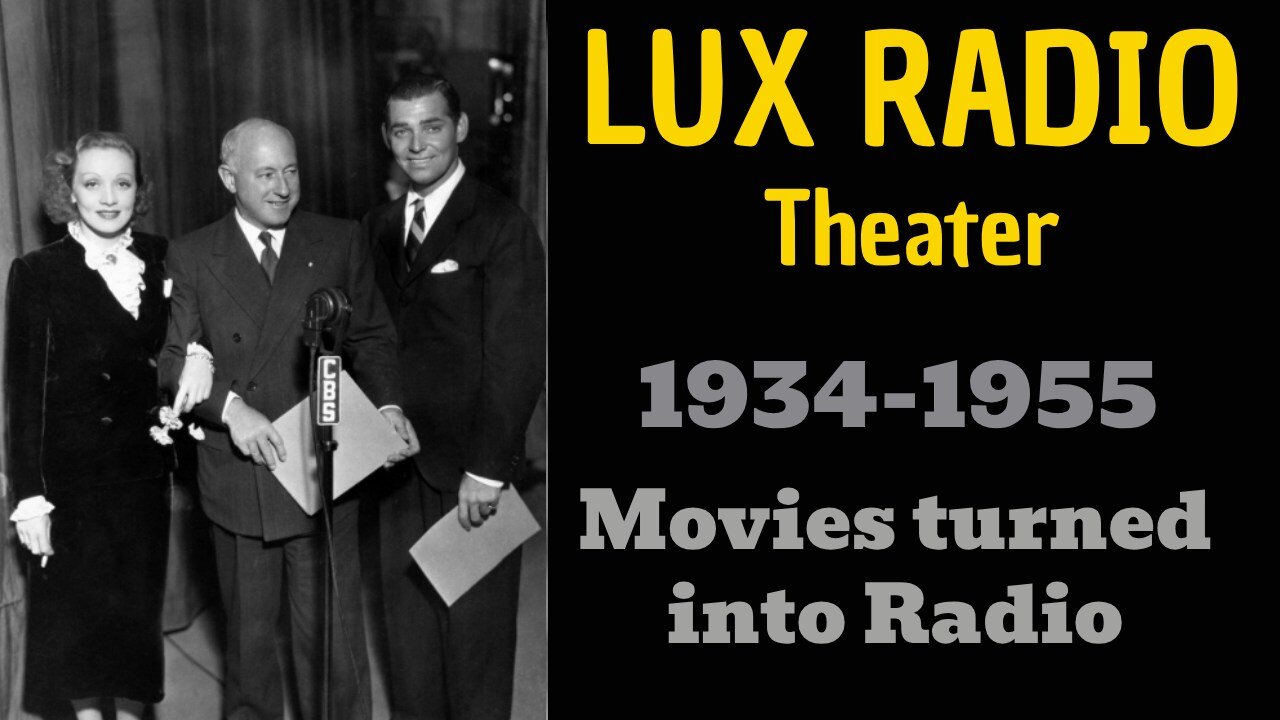Premium Only Content

Lux Radio 43-02-22 (ep384) This Is the Army ( George Murphy, Ronald Reagan, Alan Hale Sr.)
American wartime musical comedy
Plot
In World War I, song-and-dance man Jerry Jones is drafted into the US Army, where he stages a revue called Yip Yip Yaphank. It is a rousing success, but one night during the show orders are received to leave immediately for France: instead of the finale, the troops march up the aisles through the audience, out the theater's main entrance and into a convoy of waiting trucks. Among the teary, last-minute goodbyes Jones kisses his newlywed bride Ethel farewell.
In the trenches of France, several of the soldiers in the production are killed or wounded by shrapnel from a German artillery barrage. Jones is wounded in the leg and must walk with a cane, ending his career as a dancer. Nevertheless, he is resolved to find something useful to do, especially now that he is the father of a son. Sgt. McGee and Pvt. Eddie Dibble, the troop bugler, also survive.
Twenty-five years later World War II is raging in Europe. Jerry's son Johnny enlists in the Army shortly after Pearl Harbor. He tells his sweetheart Eileen Dibble that they cannot marry until he returns, since he doesn't want to make her a widow.
Lux Radio Theatre was indisputably the biggest, most important, most expensive drama anthology program on radio. It ran from October 14, 1934 until June 7, 1955, then continued on television as Lux Video Theatre until 1957. In all, some 926 episodes were broadcast, providing a record of the most important entertainment events in American theatre and, later, film.
The show was first broadcast on the NBC Blue Network on Sundays at 2:30 PM. The show featured adaptations of successful Broadway plays when it was produced out of New York, such as Seventh Heaven, the first production starring Miriam Hopkins, Smilin' Through, Berkeley Square, Daddy Long Legs, Peg O' My Heart and Way Down East. On July 29, 1935, the show moved to Monday night at 9:00 PM on CBS, where it would stay until June 29, 1954. The show moved to Hollywood on May 25, 1936 with the production of The Legionnaire and the Lady, based on the film Morocco, starring Marlene Dietrich and Clark Gable. The audience for this production was estimated as high as 40 million. The show featured many of the most important films of the period, adapted to fit the 60 minute time slot. Some of the titles for 1939 should indicate the caliber and range of shows: Stage Door, Ceiling Zero, So Big, It Happened One Night, The Lives of a Bengal Lancer, Lady for a Day, The Life of Emile Zola, Tovarich, Only Angels Have Wings, The Prisoner of Zenda, The Awful Truth, Wuthering Heights, You Can't Take It With You, The Old Maid and Goodbye, Mr Chips. For its last season, (1954-1955), the show moved to Tuesday nights at 9 on NBC.
Lux Radio Theatre was always broadcast live, with a studio audience and a full orchestra accompanying the performance and providing musical transitions between scenes. As many film actors were used to numerous takes and not live performance, they sometimes suffered acute stage fright before the show. However, since most received $5,000 for their performance -- in addition to free publicity for upcoming pictures -- actors appeared in their original screen roles if they were available. Indeed, production would halt if necessary, on a film if performers were called to appear on Lux. When the actors were not available, others stepped in. The plays were assembled and rehearsed for a week, in sharp contrast to many other shows, which required a minimal of an actor's time. Regular players for the series included Jim and Marian Jordan, otherwise known as Fibber McGee and Molly. Hosts included Cecil B. DeMille (1936-1945), William Keighley (1945-1952) and Irving Cummings (1952-1955). Directors included Tony Stanford, Frank Woodruff, Fred MacKaye and Earl Ebi.
-

DLDAfterDark
2 hours ago $0.65 earnedDLD Live! What's Your Typical EDC/Civilian Load Out? Guns & Ammo & EDC?
9.56K -
 1:30:48
1:30:48
Redacted News
9 hours agoBREAKING! TRUMP AND PUTIN NEARING PEACE BUT EUROPEAN WARMONGERS TRYING TO STOP IT | REDACTED
164K239 -
 52:40
52:40
Candace Show Podcast
9 hours agoSaturday Night Lively: What Were They Thinking? | Candace Ep 148
142K148 -
 LIVE
LIVE
Man in America
4 hours agoDocumentary: The Money Masters 'How International Bankers Gained Control of America'
1,925 watching -
 1:10:40
1:10:40
PMG
1 day ago $0.98 earnedTom Hanks Plays a Racist MAGA Supporter On SNL!! UNBELIEVABLE
15.5K1 -
 2:11:29
2:11:29
Adam Does Movies
8 hours ago $1.62 earnedAsk Me Anything - Live!
24.3K -
 56:18
56:18
Flyover Conservatives
1 day agoFollow the Money: $4.7 Trillion in Government Fraud EXPOSED!; Flu Shots, Fear & Big Pharma Lies—What They DON’T Want You to Know - Dr. Stella Immanuel | FOC Show
29.4K -
 1:16:24
1:16:24
Anthony Rogers
1 day agoEpisode 354 - Current Events, Weather, and Other Clickbait
32.6K2 -
 25:10
25:10
Producer Michael
9 hours agoTHE HOTTEST FRAGRANCES FOR 2025!
32.2K2 -
 18:44
18:44
Clownfish TV
5 days agoHollywood Has a DEI Temper Tantrum!
19.9K7